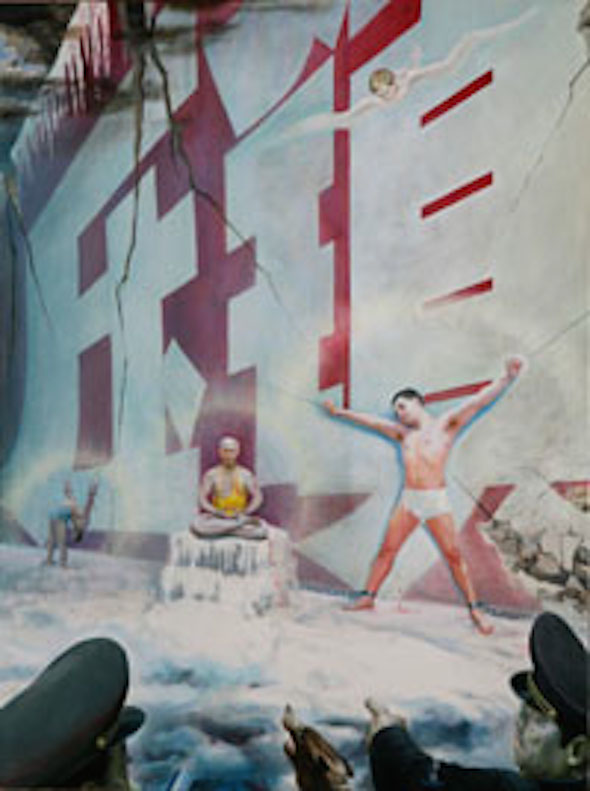Falun Gong Artists Tortured by Chinese Government Are Fighting Back
Liberty Roundtable
Written by LRT Editor // September 12, 2014
By: Steven W. Mosher

Exposing the persecution of Falun Gong with oils, canvas and clay
Professor Zhang Kunlun, a well-known Chinese sculptor and painter, spent three months in a PRC reeducation-through-labor camp. Chained to the wall of his cell, he was tortured by the guards, who sometimes used their fists and sometimes used electric batons in their efforts to break his will.
The guards were demanding that he renounce his membership in a Buddhist sect called Falun Gong. Zhang steadfastly refused, even though he knew that each refusal would bring renewed torture.
When he was finally released, bloody but unbroken, he decided to fight back through his art. Gathering together a group of fellow Falun Gong practitioners, some of who had also been imprisoned, he and his fellow artists set about documenting their experience.
The art exhibit that resulted is named after the three principles of Falun Gong, Truthfulness, Compassion, and Tolerance, or Zhen, Shan, Ren in Chinese. It is at once a tribute to the courage of the Falun Gong practitioners under adversity, an exposé of the sufferings of China’s political prisoners, and a mute cry for justice.
The centerpiece is a work by Zhang himself called “Red Wall,” shown above. The two white Chinese characters on the huge red wall mean “persecution” and refer to the persecution of believers of all stripes, persecution that is so intense in China that it makes the country seem like one big walled-in prison. Yet there is a crack spreading down the red wall. Despite its apparent solidity, the wall will not stand forever.
Harder to look at are scenes of torture, of which there are many. One depicts Chinese physicians and police harvesting the organs of a helpless Falun Gong prisoner. The victim was sentenced to die in this horrible fashion not because he committed a crime, but merely because he happened to be a tissue match for someone willing to pay tens of thousands of dollars for a heart, lung, or liver. Thousands of imprisoned Falun Gong have been murdered in this fashion. The victims—of what can only be called “human sacrifice”—are not even properly anesthetized before they are sectioned alive and their organs extracted.
As these two paintings from “The Art of Zhen Shan Ren” exhibit suggest, the ferocity with which the Chinese Party-State has publicly vilified the Falun Gong movement, and attacked, imprisoned and murdered its adherents, almost defies description.
The Chinese Communist Party has been hostile to religion from the very beginning. Indeed, in the early years of the People’s Republic of China it sought to crush the Catholic Church and other organized religions out of existence.
Even today believers, be they Catholic, Christian, Muslim, or whatever, remain second-class citizens. They are not allowed the join the Party, whose official creed is atheism. They cannot hold any sensitive government positions. Most revealingly, they are not allowed to join the People’s Liberation Army. I once asked a faithful Chinese Catholic why Christians would be barred from the PLA. “They don’t trust us with guns,” he bluntly replied.
But the brutal campaign against the Falun Gong goes far beyond the persecution suffered by Catholics, or any other religious group for that matter, in recent years. It is a campaign that is being carried out by a Party-State that seems determined to wipe these peaceful and prayerful Buddhists off the face of the earth. It is a campaign, in short, of annihilation.
This came through clearly in a letter I received several years ago from Minister Counselor He Yafei of the Chinese Embassy. I had invited Minister He to attend a conference that my organization, the Population Research Institute, was holding in Washington, D.C., to discuss human rights in China.
We had invited democracy activists, lawyers, human rights defenders, religious leaders, journalists, trade unionists, ”unofficial” church members, members of the “underground” Catholic Church—and, of course, leading representatives of the Falun Gong.
Minister He rejected my invitation out of hand, responding:
“I hope you can understand that no Chinese diplomat can allow himself to sink so low as to sit with the convicted criminals of his own country. I would also like to express my doubt that your conference can reach a factual conclusion on China’s human rights situation if it is strongly influenced by the views of these criminals.”
In the view of the Chinese Communist Party, all the practitioners of Falun Gong are criminals.
But it was not always so. In the beginning, the government actually encouraged Falun Gong, seeing no threat in its peaceful assemblies of exercising and meditating grannies.
The rapid growth of the movement over the nineties alarmed the government, however, and it withdrew its support. In response, 10,000 followers of Falun Gong peacefully gathered outside of the main government compound in Beijing in April 1999 asking for official recognition.
Instead, the leaders of the Chinese Communist Party launched a campaign to “eradicate” Falun Gong. Government propaganda denounced the practice as an “evil cult.” Hundreds of thousands of practitioners were arrested and detained in “re-education through labor” camps and prisons. There, like Professor Zhang, they were tortured and abused in an effort to force them to recant.
Communist officials like Minister He may consider Falun Gong to be “criminals,” but history will decide who the real criminals are: The members of the Falun Gong, or the leaders of the Party-State that ordered the brutal suppression of this peaceful Buddhist group.
As for Professor Zhang, he simply says:
“Our art comes from a pure heart and our work reflects our personal experience. Art is able to greatly influence the way people think and it also directly connects with human morality. And the two interact.”
